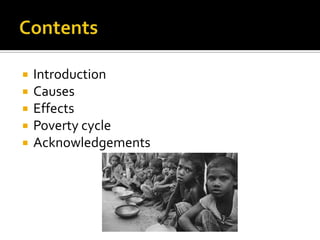Causes and Effects of Poverty
- 1. Done by: SGT Joshua Tan SGT Lie Yi Sien SSG Lim Yu Jie SSG Lyndon Leow
- 2. Introduction Causes Effects Poverty cycle Acknowledgements
- 3. Poverty is the pronounced deprivation of well-being. It is not being able to satisfy one's basic needs because one possesses insufficient money to buy services or lacks the access to services. Absolute poverty refers to the state of severe deprivation of basic human needs, which commonly includes food, water, sanitation, clothing, shelter, healthcare, education and information. Relative poverty refers to as being below some relative income threshold, where this threshold differs for each society or country. One may be relatively poor, without being in the state of absolute poverty; relative poverty is often considered as an indirect measure of income inequality.
- 4. There are many theories theorists had came up with to the cause of poverty. Some theorists have accused the poor of having little concern for the future and preferring to “live for the moment”; others have accused them of engaging in self-defeating behaviour. Still other theorists have characterized the poor as fatalists, resigning themselves to a culture of poverty in which nothing can be done to change their economic outcomes. In this culture of poverty—which passes from generation to generation—the poor feel negative, inferior, passive, hopeless, and powerless.
- 5. The effects of poverty are serious. Children who grow up in poverty suffer more persistent, frequent, and severe health problems than children who grow up under better financial circumstances. Many infants who were born in families originally suffering from poverty have a low birth weight, which is related to many preventable mental and physical disabilities. Not only are these poor infants more vulnerable to diseases and illnesses, they have higher possibility of dying before their first birthday. Children raised in poverty tend to miss school more often because of illness. These children also have a higher records of accidents than others, due to the great possibility of having impaired vision and hearing, iron deficiency anaemia, and higher levels of lead level in the blood, which can impair brain functions.
- 6. Levels of stress in the family have also been shown to increase with accordance to economic circumstances. Studies during economic recessions show that job loss and subsequent poverty are associated with violence in families, including child and elder abuse. Poor families experience more stress than middle-class families. Besides financial uncertainty, these families are also more likely to be exposed to series of negative events and “bad luck”, including illness, depression, eviction, job loss, criminal victimisation and family death. Parents who experience hard economic times may become excessively strict and erratic, issuing demands backed by insults, threats, and corporal punishment.
- 7. The cycle of poverty has been defined as a phenomenon where poor families become trapped in poverty for at least three generations. In calculations of expected generation length and ancestor lifespan, the lower median age of parents in these families is offset by the shorter lifespans in many of these groups. Such families have either limited or no resources. There are many disadvantages that collectively work in a circular process making it virtually impossible for individuals to break the cycle. This occurs when poor people do not have the resources necessary to get out of poverty, such as financial capital, education, or connections. In other words, poverty-stricken individuals experience disadvantages as a result of their poverty, which in turn increases their poverty. This would mean that the poor remain poor throughout their lives. This cycle has also been referred to as a "pattern" of behaviours and situations which cannot easily be changed.
- 8. http://en.wikipedia.org/wiki/Poverty http://www.cliffsnotes.com/study_guide/Cau ses-and-Effects-of-Poverty.topicArticleId- 26957,articleId-26882.html http://en.wikipedia.org/wiki/Cycle_of_povert y Google images









